Impacts of COVID-19 – The Global Access to Justice Survey
The COVID-19 pandemic has taken all nations on the planet by surprise and continues to drive the quest for efficient and effective remedies, both scientific and social, that will contain the spread of this highly contagious virus. In addition to initiating a humanitarian crisis, the outbreak is triggering multiple impacts (social, political, economic, environmental etc.) on the global stage, whose consequences – both negative and positive – were not only unforeseen, but remain unpredictable, although we can be sure they will inevitably touch, one way or another, our justice and legal aid systems.
In order to obtain the very latest information on the ambivalent impacts of COVID-19 on a sample of the world’s justice and legal aid systems, between 7 and 27 April 2020 the Global Access to Justice Project conducted an empirical survey that collected both quantitative and qualitative data on how access to justice has changed due to the pandemic from the following 51 countries: Australia, Belgium, Brazil, Bulgaria, Cambodia, Canada, Chile, China, Colombia, Cuba, Cyprus, Democratic Republic of Congo, Denmark, Ecuador, Ethiopia, Finland, France, Georgia, Honduras, Hungary, India, Ireland, Italy, Japan, Kazakhstan, Kenya, Kosovo, Lithuania, Malawi, Maldives, Mongolia, Namibia, Nepal, Netherlands, New Zealand, North Macedonia, Pakistan, Poland, Portugal, Seychelles, Sierra Leone, Singapore, South Africa, Spain, Taiwan, Tajikistan, Tanzania, United States, Vanuatu, Zambia and Zimbabwe.
Given that the pandemic is ongoing, the survey has had to contend with a moving scenario in which the situation in each country is constantly changing and at variable speed. Notwithstanding this highly dynamic, unpredictable and unstable global context, the preliminary survey results provide a reasonably accurate and up-to-date snapshot of the response of the access to justice movement at this particular moment to the dramatic COVID-19 pandemic.
In summary, the survey analyzed some of the negative impacts of COVID-19 on both the supply and demand for legal services from three different angles, that of: (i) a summary, or ‘helicopter’, overview; (ii) vulnerable groups; (iii) the judicial and legal aid systems.
Overview of COVID-19 Impacts
From a general standpoint, the survey collected and analyzed information on different measures imposed by national governments in order to curtail the spread of COVID-19. Although the evaluation of these sanitary measures has not been the main focus of the research, the data provide a valuable context that help explain responses of judicial and legal aid systems in the face of the outbreak.
According to the survey results, preventative measures such as special hygiene requirements (eg. social distancing, use of face masks, washing hands frequently, etc.) quickly entered on to the global agenda and were adopted by all of the countries analyzed. In an attempt to flatten the COVID-19 curve and prevent or slow down its transmission, national governments also imposed a range of other measures: travel restrictions from abroad (86%), mandatory closure of educational institutions (94%) and non-essential businesses (76%). Mandatory social isolation measures were also deployed, to a greater or lesser extent, by 92% of the countries analyzed, and the drastic measure of lockdown (total ban on leaving home) was adopted by 47% of them, with the penalty of imprisonment (41%) and/or fine (73%) for breach of these preventative measures.
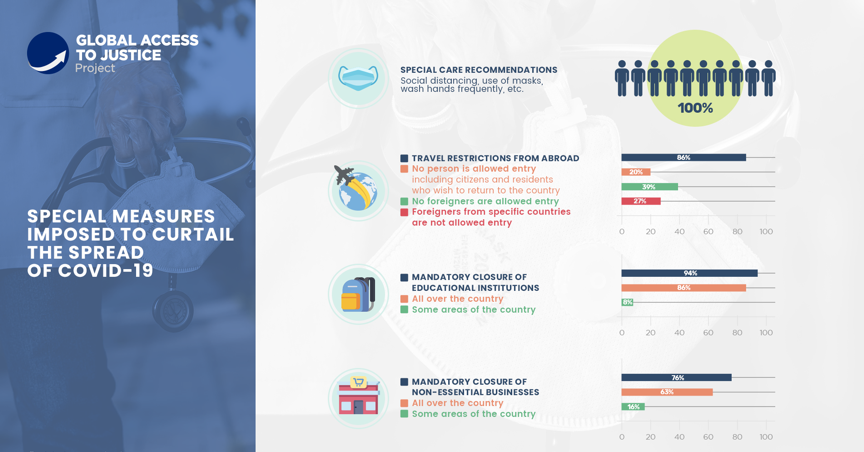
While the pandemic advances and envelops us all, from those living in developed countries to those in low income nations, human rights violations are being committed under the pretext of curtailing the threat of COVID-19 in 31% of the countries analyzed. Data made available by Heal Zimbabwe indicate 27 cases of violence, perpetrated by the Zimbabwe Republic Police and the Zimbabwe National Army on unarmed civilians, who were queuing or searching for mealie-meal and other essential groceries. In Zambia, national experts reported the excessive use of force by police officers during the enforcement of guidelines on preventing the spread of coronavirus. Moreover, in South Africa eight deaths at the hands of police and military for breaches of lockdown remain under investigation. Human rights violations have also been reported in Belgium, Cambodia, Canada, Cyprus, Democratic Republic of Congo, Ethiopia, Hungary, Kenya, Kosovo, Namibia, Nepal, Pakistan and Poland.
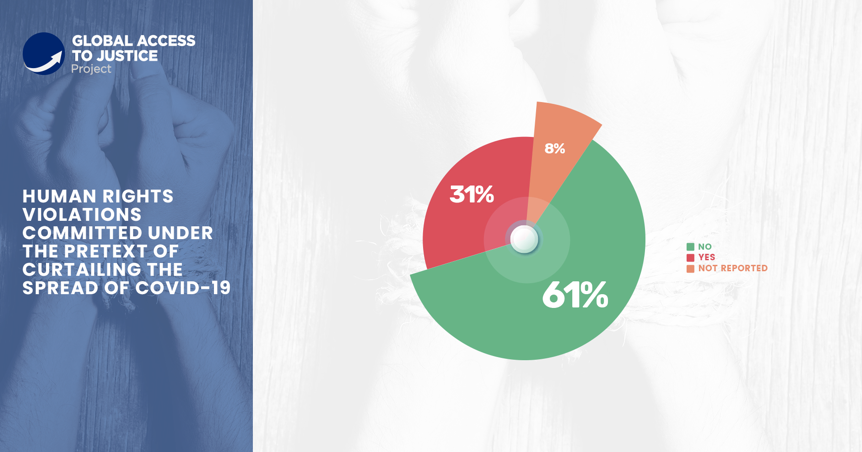
The survey also identified that 25% of the countries analyzed had taken coercive measures to concentrate power in the hands of the Head of State (or equivalent governmental authority) under the pretext of curtailing the spread of COVID-19 (e.g. suspending parliament / sittings of the legislature). Perhaps the most draconian example is the “Authorization Act” (Act XII of 2020 on the Containment of the Coronavirus), which allows the Hungarian Government to rule by absolute decree indefinitely, practically without any debate in Parliament or any guarantee of swift and effective judicial review of the constitutionality of such measures.
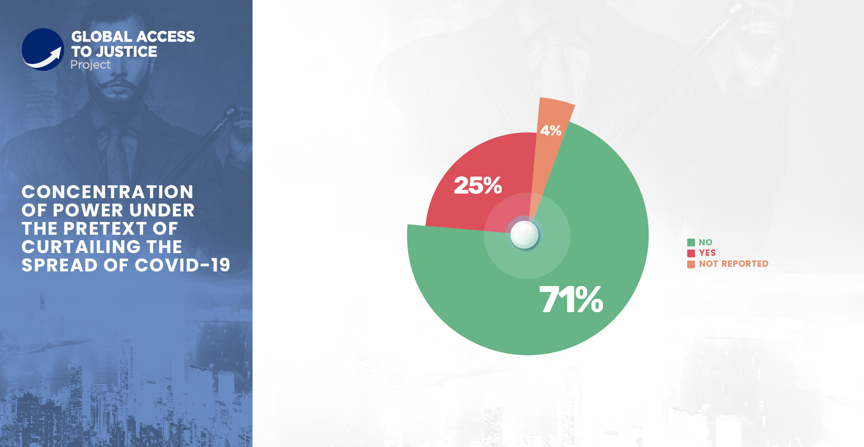
Negative impact of COVID-19 on vulnerable groups
The survey also analyzed the negative impacts of COVID-19 on some vulnerable groups, which were disproportionately affected by the outbreak.
In the context of gender-based and family violence, the data are alarming. In Brazil, the number of femicides increased 44.9% during the quarantine, while other lethal crimes committed against the rest of the population decreased by 19% (data related to the state of São Paulo). In China, the initial focal point of the pandemic, cases of gender-based violence practically doubled during the quarantine period, while Cyprus, France, Singapore and Taiwan all reported an increase of 30%. National experts also reported a significant increase in the number of such incidents in Argentina, Chile, Colombia, England, Italy, Mexico, Nepal and Spain. Moreover, according to a survey recently published by Statistics Canada, 12% of young women aged between 15 and 24 were very, or extremely, anxious about the possibility of domestic violence.
The causes for the increase of gender-based and family violence during the pandemic are multifactorial, involving not only the confinement of victims and aggressors, but also the social anomie resulting from the distancing of women and girls from their support and protection networks (friends, family members, non-governmental organizations, etc.). Notwithstanding the evident female vulnerability, a majority of national governments failed to take special preventative measures for gender-based and family violence during lockdown (53%).
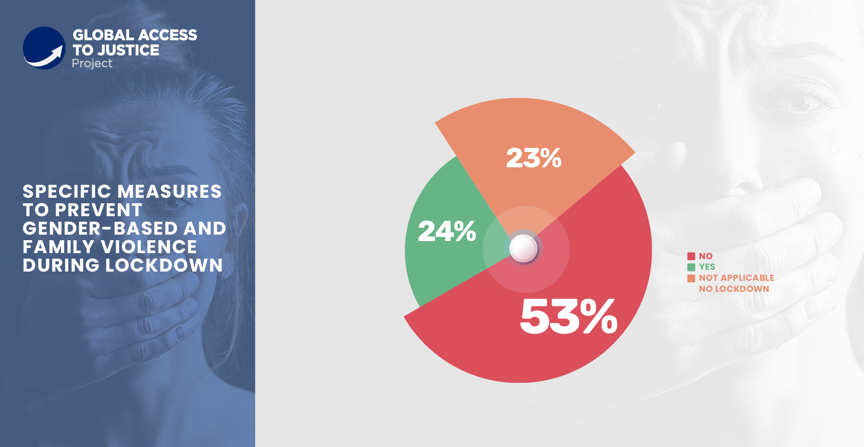
It is not only women and girls who have been left behind by public policies. The majority of the countries analyzed also remained passive in not implementing housing solutions for people experiencing homelessness during the outbreak (63%).
In an effort to curtail the spread of COVID-19 in prisons, 47% of the nations analyzed implemented measures for the early release of prisoners. In the vast majority of countries, allocation of prisoners to sole-occupancy cells proved to be impossible mainly due to the overcrowding of prisons (only 14% were able to meet this objective). Limiting visits to prisoners was the most widely used measure, adopted by 92% of the countries analyzed, although the right to be visited by a lawyer was guaranteed by some (e.g. Bulgaria, Ethiopia, Spain). In an effort to mitigate the negative effects of these restrictions, some countries experimented with: the use of videoconferences (e.g. Colombia, Ireland, Hungary), extending the right to make telephone calls (e.g. France, Italy, Netherlands, New Zealand, Singapore) and allowing greater access to television (e.g. France).
Negative impact of COVID-19 on judicial and legal aid systems
While on the plus side mandatory social isolation measures appear in many instances to have motivated justice systems and legal aid agencies to invest in the use of technology in order to avoid face-to-face contact (more than 70%) it also appears that limited resources and improvised solutions have undermined the capacity to maintain normal levels of access to justice during the pandemic (51% of the countries analyzed).
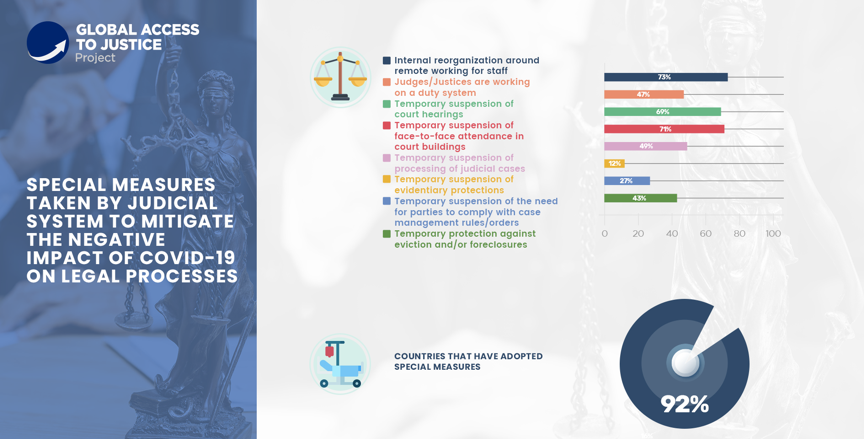
It seems that the widespread disruption to justice systems and legal aid agencies will continue for the foreseeable future, and it appears the economic crisis triggered by mandatory social isolation measures has already in some countries raised the prospect of cuts to legal aid funding (25%).
Although the immediate focus is understandably on the scientific and medical spheres (e.g. infection, recovery and mortality rates and the quest for a vaccine), research should not ignore the longer-term legal and economic implications of the COVID-19 pandemic.
Currently, only 8% of justice systems continue to work normally; and while 92% of judicial authorities are now delaying or suspending all matters except those deemed “urgent”, in some countries serious doubts arise as to their capacity to maintain the rule of law during the pandemic, or to prevent the arbitrary infringement of civil liberties, whether by private individuals, organizations or governmental authorities (4%).
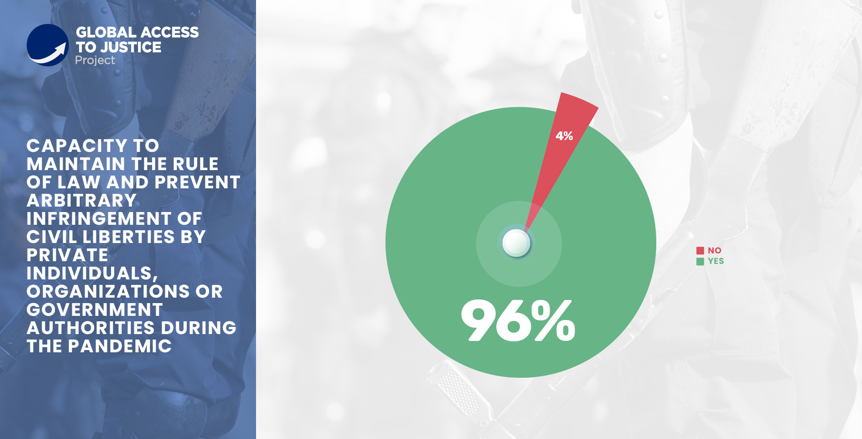
Although many questions remain unanswered and the lives of billions of people are put at risk, it seems clear that justice systems cannot afford to remain passive or unresponsive, otherwise in some countries the rule of law itself may well be included amongst the victims of COVID-19.
Helfen Sie, die Verfassung zu schützen!
Die Verfassung gerät immer mehr unter Druck. Um sie schützen zu können, brauchen wir Wissen. Dieses Wissen machen wir zugänglich. Open Access.
Wir veröffentlichen aktuelle Analysen und Kommentare. Wir stoßen Debatten an. Wir klären auf über Gefahren für die Verfassung und wie sie abgewehrt werden können. In Thüringen. Im Bund. In Europa. In der Welt.
Dafür brauchen wir Ihre Unterstützung!



